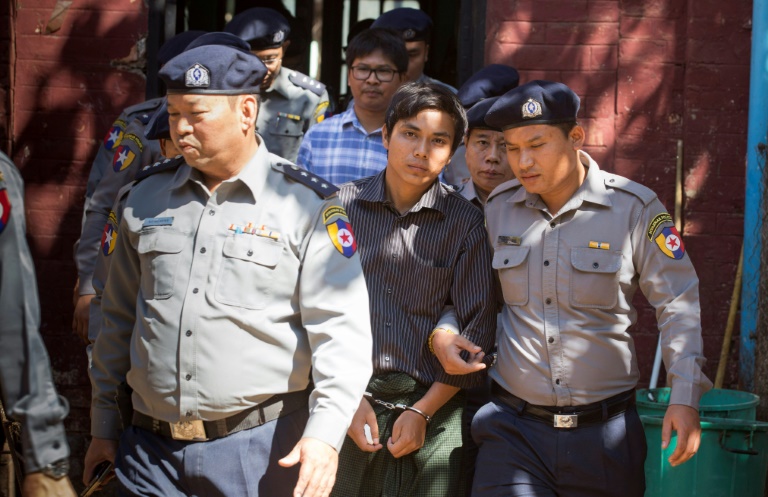A Myanmar court on Thursday denied bail to two Reuters journalists charged under a secrecy act that could see them face up to 14 years in jail, in a case that has sparked outcry over shrinking media freedom.
Myanmar nationals Wa Lone, 31, and Kyaw Soe Oo, 27, are accused of possessing classified documents thought to relate to the violent military crackdown on the Rohingya Muslim minority.
The campaign in northern Rakhine state has forced nearly 700,000 Rohingya Muslims over the border into Bangladesh since August, many carrying allegations of rape, mass murder and arson at the hands of Myanmar’s army.
“The court has decided not to give them bail,” judge Ye Lwin told the Yangon court of charges under the colonial-era Official Secrets Act.
The journalists, who have been in custody since December, say they were given the papers by two policemen who had invited them to dinner in the outskirts of Yangon.
As they left the restaurant, they say they were arrested before they even had a chance to look at the documents — a timeline that observers allege points to a set-up police operation.
The court had discretion to grant bail if it deemed that their detention had been unlawful.
Calls for Release of the Reuters Journalists
Human rights groups and a cast of diplomats and international grandees, including former US president Bill Clinton, have called for their release.
The bail decision was crucial as pre-trial hearings are expected to drag on for several months before the court officially decides whether to take on the case or not.
The pair are now expected to remain in jail throughout that period.
“I hoped to get it (the bail),” Mr. Lone’s wife Pan Ei Mon said, crying at the ruling.
“I even cleaned his room last night to prepare for him getting bail.”
Mr. Soe Oo, in handcuffs, was briefly able to hold his two-year-old daughter outside the courtroom before being led away by police.
Reuters said it was “disappointed” by the court decision but said it believed the “proceedings will demonstrate their innocence”.
The news agency has refused to comment on the exact details of what its correspondents were reporting on at the time of their arrest.
But it is widely thought they were investigating a massacre of Rohingya in the village of Inn Din in northern Rakhine.
The military later acknowledged members of the security forces took part in extrajudicial killings of Rohingya suspected ‘terrorists’ at the village, saying it would hold those responsible to account.
Reports of Ethnic Cleansing
Myanmar’s military says its campaign in Rakhine was a justified response to root out Rohingya militants behind a series of attacks in August that left a dozen border police dead.
Since then northern Rakhine has largely been cut off to aid groups, media, and diplomats, except on officially sanctioned and chaperoned trips.
The plight of the Rohingya – labelled as “ethnic cleansing” by the U.N. and U.S. – garners little sympathy among the majority-Buddhist population, many of whom regard them as illegal “Bengali” immigrants.
U.N. Special Rapporteur to Myanmar Yanghee Lee added her voice in support of the journalists from a press conference in Seoul, calling the pair “brave” and “fearless” while decrying the “culture of fear, silence and self-censorship” threatening the country.
She has been banned from Myanmar by authorities who say she is working with a bias against Myanmar.
“I remain deeply perplexed and concerned that they remain in detention despite the military having admitted responsibility for the killings at Inn Din,” she added.
The next pre-trial hearing for the two journalists is due on February 6.
A deal has been cut to send back 1,500 Rohingya refugees a week from overcrowded camps in Bangladesh to Rakhine State.
But repatriation is yet to begin.
Many refugees do not feel safe returning to a state rife with communal violence and where mysterious murders, disappearances, and arson attacks on Rohingya homes were reported as recently as last week.


